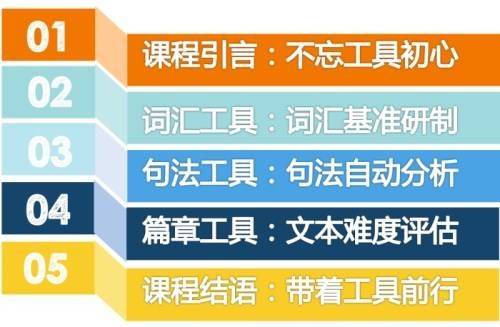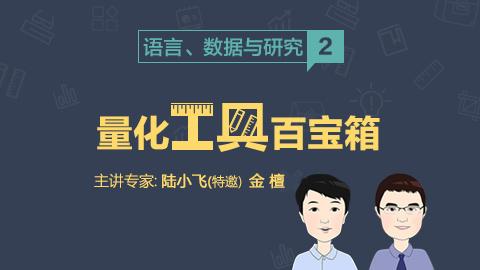【友情提示】
1. 如需邀请函,请点击 下载邀请函。
2. 本课程学习有效期为180天。
3. 有任何疑问或建议欢迎与我们联系
服务时间:8:30 - 23:00
外研在线:4008-987-008
【课程简介】
本课程是为外语教师、研究生及高年级本科生设计的“量化工具使用”入门课程。课程选取“词汇工具”“句法工具”和“篇章工具”,进行讲解与示范。
- “词汇工具:词汇基准研制”,讲解如何使用Range和Sketch Engine来统计词频、制作词表及检索例句等;
- “句法工具:句法自动分析”,特邀美国宾夕法尼亚州立大学陆小飞博士讲解并演示“句法复杂度分析器”;
- “篇章工具:文本难度评估”,介绍“英语文本指难针”,并讲解如何使用Coh-Metrix进行多维度特征分析。
课程旨在帮助学员学会形成自己的研究问题,并针对研究问题采用合适的研究工具收集数据、分析数据并撰写报告,从而做到用好工具、做好研究并写好文章。
【主讲专家】

陆小飞 (特邀主讲)
美国俄亥俄州立大学语言学博士;现任美国宾夕法尼亚州立大学应用语言学系研究生部主任、教授、博士生导师、广东外语外贸大学云山讲座教授、华中科技大学客座教授、中山大学英语水平测试顾问。主要研究领域为语料库语言学、学术英语、二语写作、二语习得及计算机辅助语言教学。在Springer出版专著Computational Methods for Corpus Annotation and Analysis 与编著Computational and Corpus Approaches to Chinese Language Learning;在Applied Linguistics、Educational Researcher、International Journal of Corpus Linguistics、Language Testing、TESOL Quarterly、The Modern Language Journal等SSCI权威期刊发表论文近30篇;开发的二语句法复杂度分析器和词汇复杂度分析器得到国际上二语写作与习得研究者的广泛应用。担任中国学术英语教学研究会国际顾问,Cogent Education 副主编,Journal of Second Language Writing等多种期刊编委或顾问,Applied Linguistics等40余种国际期刊特约审稿人。主持或参与ETS、美国教育部、美国Spencer基金、中国国家社科基金、教育部社科基金等资助的多个研究项目。

金 檀(主讲专家)
华南师范大学外国语言文化学院教授,研究兴趣为语料库语言学、语言测试与评估及计算机辅助语言学习。开展口语表现诊断研究,主持研制“口语特征评分法”,提供口语反馈的智能辅助;开展阅读难度调控研究,主持开发“阅读分级指难针”,提供阅读素材的智能改编;开展写作语体匹配研究,主持建设“写作表达范文库”,提供写作资源的智能推荐。
【课程目录】

【课程特色】

【课程目标】
1. 针对高校外语教师,该课程可帮助解决以下问题:
1)原理:“工具研发原理”帮助您了解工具研发背景、掌握工具设计原理;
2)操作:“工具操作录屏”帮助您学会词汇、句法和篇章工具的操作使用;
3)选题:“前沿选题推荐”帮助您及时洞察学术前沿话题、找准科研目标。
2. 针对相关专业学生,该课程可帮助解决以下问题:
1)毕业:掌握量化研究工具的操作方法,顺利完成毕业论文;
2)研究:了解量化研究的前沿学术动态,成功变身学术达人!
【证书机制】

【参考文献】
除第五讲(根据学员问答具体内容后续推荐文献)外,学员在学习每讲视频之前,请务必阅读参考文献。
第一讲:
1) 金檀. (2016). “如何迅速找准量化研究问题”,《“阿檀小倪讲量化”微课要点讲义》(第6-11页)
2) 郭凯、孙望. (2016).《“阿檀小倪讲量化”常见问答札记》
3) 郭凯、孙望. (2016).《“阿檀小倪讲量化”文献推荐总结》
点击链接阅读以上文献:https://pan.baidu.com/s/1NofuCaaYufyhuPGJl-fbuw
第二讲:
1) Miller, D., & Biber, D. (2015). Evaluating reliability in quantitative vocabulary studies: The influence of corpus design and composition. International Journal of Corpus Linguistics, 20(1), 30-53.
2) Hsu, W. (2013). Bridging the vocabulary gap for EFL medical undergraduates: The establishment of a medical word list. Language Teaching Research, 17(4), 454-484.
3) Durrant, P. (2016). To what extent is the academic vocabulary list relevant to university student writing? English for Specific Purposes, 43, 49-61.
第三讲:
1) Lu, X. (2010). Automatic analysis of syntactic complexity in second language writing. International Journal of Corpus Linguistics, 15(4), 474-496.
2) Lu, X. (2011). A corpus-based evaluation of syntactic complexity measures as indices of college-level ESL writers' language development. TESOL Quarterly, 45(1), 36-62.
3) Yang, W., Lu, X., & Weigle, S. C. (2015). Different topics, different discourse: Relationships among writing topic, measures of syntactic complexity, and judgments of writing quality. Journal of Second Language Writing, 28, 53-67.
第四讲:
1) Green, A., & Hawkey, R. (2012). Re-fitting for a different purpose: A case study of item writer practices in adapting source texts for a test of academic reading. Language Testing, 29(1), 109-129.
2) Jin, T., Li, Y., & Li, B. (2016). Vocabulary coverage of reading tests: Gaps between teaching and testing. TESOL Quarterly, 50(4), 955-964.
3) Graesser, A. C., McNamara, D. S., & Kulikowich, J. M. (2011). Coh-Metrix: Providing multilevel analyses of text characteristics. Educational Researcher, 40(5), 223-234.
【在线工具】
【工具1】Range
http://www.victoria.ac.nz/lals/about/staff/paul-nation
【工具2】Sketch Engine
https://www.sketchengine.co.uk/
【工具3】句法复杂度分析器
L2SCA命令行运行版:http://www.personal.psu.edu/xxl13/downloads/l2sca.html
L2SCA在线分析界面:http://aihaiyang.com/software/l2sca/
L2SCA 图形用户界面 in TAASS : http://www.kristopherkyle.com/taassc.html
【工具4】英语文本指难针
http://languagedata.net/tester/
【工具5】Coh-Metrix
【适应人群】
1. 高校外语教师,尤其是一线青年教师(准备国际/学术论文撰写、申请海外深造、国外学术交流等)
2. 语言学相关专业硕士及博士研究生
3. 语言学相关专业本科高年级学生(保研或考研意向、申请海外留学等)
【专家评语】
It has been very heartening to hear that Tan and his colleagues’ online course on quantitative methods has been well-received by college teachers and postgraduate students in China. To further support the learning of quantitative methods, Tan has launched another new online course – this time relating to using software packages in the field of applied linguistics. In this new venture, Tan has invited a scholar from Pennsylvania State University, Dr Xiaofei Lu, to join in the development of the course.
The course introduces the principles and practice of computer-assisted data analysis, covering both established and newly-developed software packages. The software packages covered include Range, Sketch Engine, L2 Syntactic Complexity Analyzer, English Text Complexity Assessor and Coh-Metrix.
In teaching the course, Tan and Xiaofei guide participants through three well-structured phases, outlining how the software packages may be used for different purposes and in different contexts.
Phase 1 establishes key concepts and specifies the background knowledge and theory underpinning each software package.
Phase 2 demonstrates a step-by-step operation process for each software package.
Phase 3 recommends potential research topics for future explorations.
Given the success and take-up of Tan's first venture into online programme delivery, I am sure that this new online venture will benefit teachers and postgraduate students even more – this time about using software packages.
—David Coniam
Chair Professor and Head of Department
Department of Curriculum and Instruction
The Education University of Hong Kong


